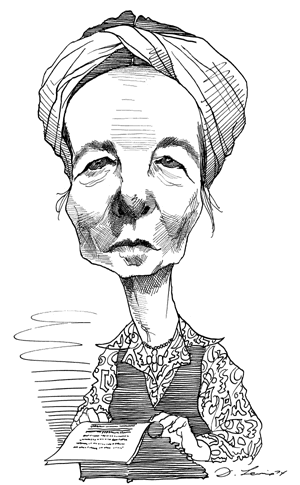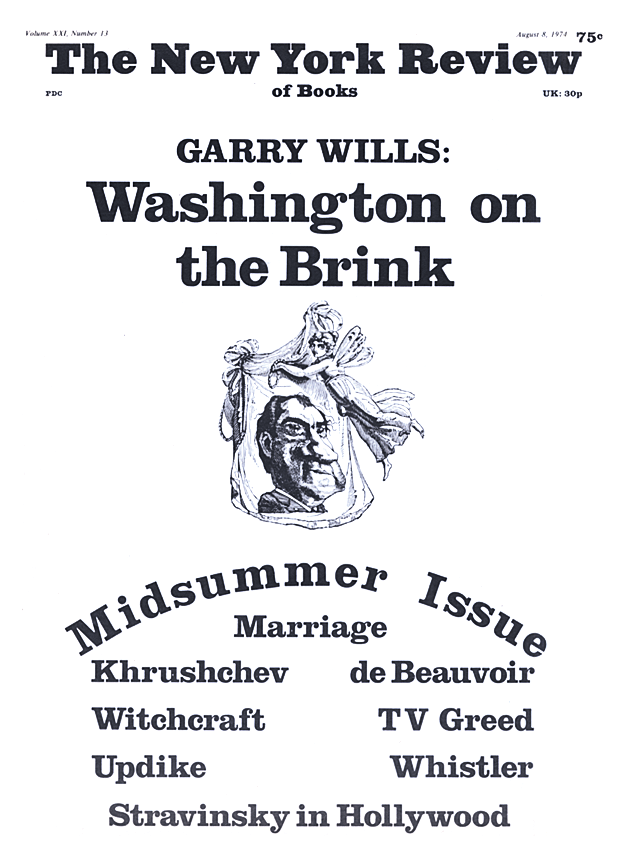In her new book Simone de Beauvoir reflects upon the events of the last ten years of her life since 1965 when Force of Circumstance, the third volume of her autobiography, was published. It was followed by an encyclopedic study of old age and that theme crops up many times in the present volume written when she was sixty-four. She has had to defend herself against the incredible personal venom of her French critics of that book, for the French have a cabaret tradition of ridiculing the elderly with a spite uncommon in other countries. Speaking on the radio one envious cad pretended to apologize for a review of a book of hers in these words:
Ever since I caught a glimpse of Simone de Beauvoir on the rue de Rennes I have been sorry for that article: she was creeping along, looking faded and haggard. One should pity the aged. That is why Gallimard goes on publishing her, by the way.
French reviewing is governed by party or publishing politics and easily falls into mean rancor or swells into the puff.
As a combative figure of the left, an atheist among militant or conventional Catholics, Simone de Beauvoir is of course used to these attacks, and they have little effect on her. It is true that she is sometimes a long-winded and humorless writer, and tutorial in a ponderous way. The first volume of her autobiography or a novel like Les Mandarins (1954) had more vivacity and direction than the present book, and one has to say that artists become diffuse when they become commentators. They generalize where they were once sharp and actual. But her confidence, her sanguine and energetic concern for the human condition are still bold. She is firm in her feminism and keeps her head about it. She fights back against the merely conventional notion that the minds of atheists are bleak and despairing because they do not believe in the afterlife; she is warm in her belief in the value of happiness and truth-telling; she has always been the enemy of stagnant “serenity”: the incurious are, for her, the self-starved. She is hard-working at sixty-four—which by contemporary standards is not old at all—and she willingly examines with detachment the differences she sees between the self of today and the self of twenty years ago. The energy, the genetic tonnage of vitality remains, but there is, she says, a loss of the sense of the future: how does that affect today’s will?
I used to reach out toward the future; I went happily toward my meeting with the woman I should be tomorrow. Now I can still fling myself into short term plans—voyages, lectures, meetings—but the full impulse that urged me on has been broken…. I am aware of my finity.
But against this:
Yet my life does not seem at all stagnant to me. Its repetitive side is no more than a background against which new things perpetually appear. I read every day; but not the same book. I write every day, but writing continually sets me unforeseen problems. And with an anxious concern I follow the unfolding course of events; they never repeat themselves and now they make part of my own history.
One advantage of old age is that it allows one to see many things from the inside which one had hitherto only seen from the outside. Human lives surprise by their changes. Why did this pretty, bewildered girl, a “stunner,” turn into a capable businesswoman; why did this bohemian rebel turn into an academician? These changes took her by surprise she thinks because she knew nothing of the childhood of these friends—which is the key to every life—the key to talent also. In youth we superimpose our own outlook on people; in age we are closer to childhood and see more of what really distinguishes human beings from one another.
Before this she has briefly analyzed the fortunate chances that formed her and turned her from a privileged middle-class Catholic girl into a teaching rebel. She drops chronology now and divides the last ten years into subjects: there are the deaths among friends. This is one of the real burdens of old age. The aging become acquainted with frenzy—time is short—but also with grief and the sight of disaster. There are descriptions of the last days of Sartre’s mother and of her own. There are the wretched who nevertheless, in their bizarre behavior, show how devious and wild or stoical the will to live is. There is a chapter on dreams, which is dull because there is nothing intimate to which we can relate them. The book does lack intimacy; but intimacy is impossible when one is writing about one’s immediate past, except to occasional artists. The author has hardened too much into seeing people “in the light of a given concept” to be that.
Advertisement
There are some interesting comments on reading—but these seem rather like republished reviews. Where I can test her—when she is writing on John Cowper Powys’s Wolf Solent—she shows a sound instinct. She understands why this very autobiographical writer was good in his novel, but was all tuppence-colored when he attempted an open autobiography. There are glimpses of herself with Sartre in Rome, where she idles, and instead of reading for information—her common habit, as a dedicated learner—she relaxes with detective stories. She confesses to reading little poetry: a pity, because poets have a direct and rejuvenating access to childhood.
By far the most absorbing part of the book is an account of her visits to the USSR, especially at the time of Khrushchev’s short, false thaw in 1962. The honeymoon of “dialogue” was wearing thin. Sartre was tormented; Simone de Beauvoir was bored with conferences, as any serious writer is. The end of Sartre’s long period of apologia was near. There was a depressing visit to a psychiatric institute where the doctors were ideologically obsessed with the attempt to isolate the chemical factor common to cases of schizophrenia and denied any influence of sexual disorder. That would be to fall in with “Western capitalist corruption.” One wretched patient appeared to be making “a confession.” She had learned by heart her doctor’s diagnosis in order to get out of the place. Wasn’t there a sexual factor in the case—the woman had said her father spied on her through the keyhole when she was in the bathroom, and the doctor replied: “A sexual factor! What an idea! The woman is married, she has two children—her life is completely normal.”
The travelers went on to the Crimea and—one of the few comic touches in the book—saw a man in bathing trunks puffing along the beach with Lenin’s portrait tattooed on one side of his chest and Stalin’s on the other. There is a visit to the Ukraine where they heard from Ehrenburg the inside story of the Brodsky trial—this writer was accused of “parasitism,” a charge brought only against prostitutes, because he was not in the Writers’ Union. He was a red-haired Jew and very lively. (He had called Marx “an old glutton crowned with fir cones.”) When the woman judge asked him, “Who has established the fact that you are a poet?” he replied, “No one. And just who has established the fact that I am a human being?” Asked why he didn’t work in a factory as some writers did, he said, “No two people are the same. Some have red hair, some are blond. Some are dark.” He got five years in a labor camp. Sartre and Mme de Beauvoir were shocked; but, I am afraid, more shocked that the young were nervously talking about God all the time. They ought to have gone back to the “true Marx,” a “living knowledge regrettably wanting in the Soviet Union.”
It puzzled the travelers that Solzhenitsyn refused to see them. Perhaps, she thinks, he did not want to tell a stranger the ideas that he was to express a year later in the Writers’ Union. He sent a message which “in effect” was:
Sartre, do you see, is a writer whose work has all been published. Every time he writes a book he knows it will be read. So I really do not feel I can talk to him: I should suffer too much.
With the invasion of Czechoslovakia, Sartre and Mme de Beauvoir, of course, broke with the Russians. Late in the day: that controversy is too well known to be discussed. There are solid chapters on journeys to Brazil, Japan, Israel, and Egypt, and accounts of the political protests in France during this period. Sartre and Mme de Beauvoir have been inveterate political travelers; one shares their indignations and I suppose one musn’t complain if their public life appears to standardize them as traveling arguments. I prefer those pages in this long book when we get some sight of the woman inside the views. I cannot believe that she is all social conscience, all teacher, all self-management. The syntax of Patrick O’Brian’s translation is often very shaky.
This Issue
August 8, 1974



